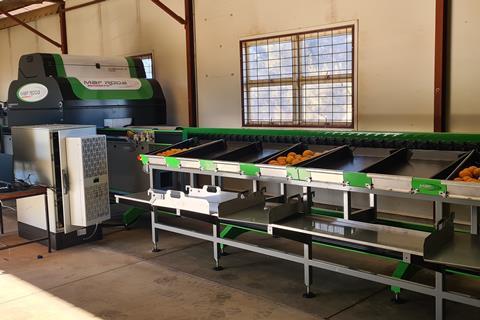The Global Scan 7 will improve data collection and analysis projects undertaken at Dareton Primary Industries and Regional Development Institute

The New South Wales Department of Primary Industries and Regional Development (NSW DPIRD) has acquired a new state-of-the-art citrus grader, marking a significant step forward in New South Wales citrus research and development.
The A$400,000 cutting-edge Global Scan 7 will enhance the department’s ability to assess fruit quality with precision, supporting growers with data-driven insights to improve productivity, market access, and sustainability across the citrus supply chain.
Tahir Khurshid, DPIRD research physiologist (tree crops) at Dareton Primary Industries and Regional Development Institute said the new technology will improve the outcomes from current and future research and development trials.
“The Global Scan 7 from Maf Oceania will assist in improving data collection and analysis once fruit are graded for weight, size distribution, fruit number and fruit blemishes,” Khurshid said. “In addition to that, the machine has the capacity to do colour grading and grading based on external fruit quality.”
New South Wales remains Australia’s largest producer of fresh oranges, accounting for 60 per cent of national production. In 2023/2024, the state produced 337,260 tonnes of oranges, valued at about A$290mn at the farmgate.
According to NSW DPIRD, the department has been ranked in the top 1 per cent of world research institutions in agricultural, plant and animal science, and is the lead agency for citrus research in Australia. Dareton Primary Industries and Regional Development Institute (NSW DPIRD) is one of the leading citrus research facilities in Australia. The research station provides both a research and extension function to horticultural industries in the Lower Murray region of New South Wales.
“A range of experiments on navel oranges, common oranges (juice), mandarins and lemons are conducted in areas of irrigation management, plant density and tree size control, nutrition, rootstock and cultivar evaluation, fruit size optimisation and improving rind quality,” Khurshid said. “Fruit yield, fruit quality (sugar/acid levels, colour) and fruit size grading are important components of these experiments.”
Dareton Primary Industries and Regional Development Institute has extensive areas of citrus trials, laboratory facilities and experienced research, advisory, technical and farm staff.
“A major deficiency has been the out-dated citrus grading machine used to size and sort fruit from research trials,” Khurshid said. “District packing sheds have adopted modern blemish and colour grading systems and citrus research at Dareton needed to keep pace with industry best practice in pre- and post-harvest technologies.”
NSW DPIRD director for research services, Alison Bowman said research at the Institute is primarily directed at improving the sustainability of citrus production and has some of the oldest citrus varieties planted in 1955 trials, along with old varieties of trees that you cannot find anywhere else in Australia.
“The department and its researchers enjoy a strong relationship with the citrus industry, targeting our work to address real world problems to give timely and accurate information to base decisions on,” Bowman said.”Research conducted at Dareton delivers far-reaching benefits, positively impacting the Murray Valley and broader New South Wakes and Australia through nationally funded projects supported by Hort Innovation and ACIAR.”



